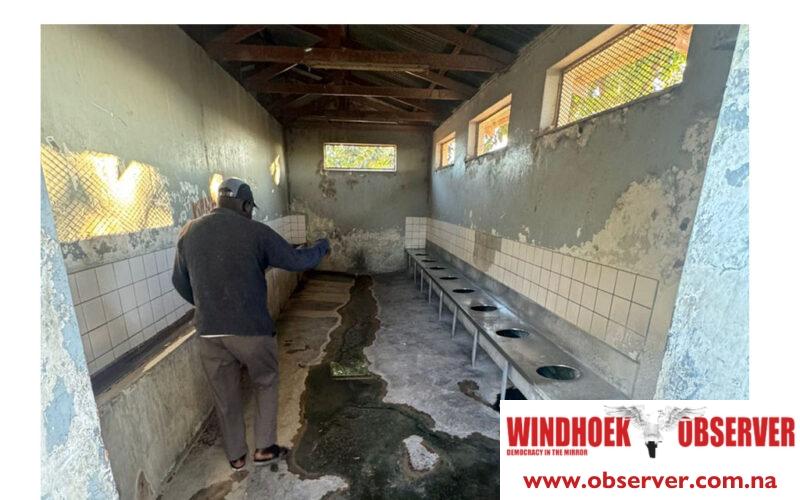Hertta-Maria Amutenja
The moment you step into the Grootfontein Single Quarters, the pungent smell of urine greets you from what should be ablution facilities.
The stench is overwhelming as if the very air is saturated with years of neglect.
Scattered rubbish and crumbling buildings tell a story of forgotten people and forsaken promises, remnants of the apartheid era.
This is the condition in which residents of single quarters have lived for years.
“There is no difference from this pigsty we are in,” said Linus Iyambo, who has been living in the single quarters since 1992.
These quarters, erected in the 1950s for contract workers, were once a symbol of opportunity.
Now, they stand as monuments to abandonment, bearing silent witness to the lives of those who have been left behind.
It is home to over 400 people, including young children.
The residents are dissatisfied with the new housing units being constructed by the municipality, so they are to be relocated to the Kaap En Bou location.
“There is no space between neighbours; even if one has a car, you’ll have no space to park it. The house is a tiny one-bedroom,” said Iyambo.
The complaints focus on the inadequacy of space and the lack of consultation with residents before construction.
They are not asking for luxury but seeking respect and a chance to live in a space that honours their humanity.
“What type of leaders build houses like that for people? They don’t live in such houses, but they expect us to live in such houses. We are hoping for the new leaders that are going to be elected to give us better houses because our current leaders are useless,” he said.
Fransina Gaeses, another resident, shared her concerns about the overcrowding issues.
“We had a meeting last month with deputy mayor Lovisa Iyambo regarding the design and construction of the houses. We aired our complaints and have not heard from the municipality since then. In my case, we are seven in one room, three adults and four children. Some sleep on the floor. A one-bedroom house will not solve our overcrowding,” she said.
Gaeses further emphasised the need for more suitable housing.
“We thought there would be some sort of development when they said they were going to move us, but it’s just the same as single quarters. We also thought they would be giving us proper homes with at least two bedrooms and a yard for future extensions. Some of us sell kapana and do odd jobs; we can pay for some of these things,” she said.
A visit to the new homes under construction revealed that some houses are close together, with about two meters of space between them.
Each house includes a kitchen, bedroom, and toilet.
Grootfontein Municipality’s acting Chief Executive Officer, Indileni Lugameni, responded to the concerns by explaining the ongoing nature of the housing project.
“I have heard such rumours of the residents not being happy with the way the houses are constructed, but not yet from the residents themselves. The construction of these houses is an ongoing project that has been going on for over ten years now. This is probably phase three or four of the construction of social housing,” he said.
According to Lugameni, the project aims to finish the construction of 65 houses by October and relocate eligible residents from the single quarters.
“We are not imposing the houses on those who do not want them. There are other options, like getting a plot and building the house as per their specifications, or buying a plot in various locations and building the mansions that they prefer. They are aware of these options, as we have had several consultations with them,” said Lugameni.
Lugameni also said the project has hired about ten SMEs to build the houses at a cost of N$10 million.
Residents remain hopeful that the upcoming elections will bring new leaders who will address their housing needs more effectively.




